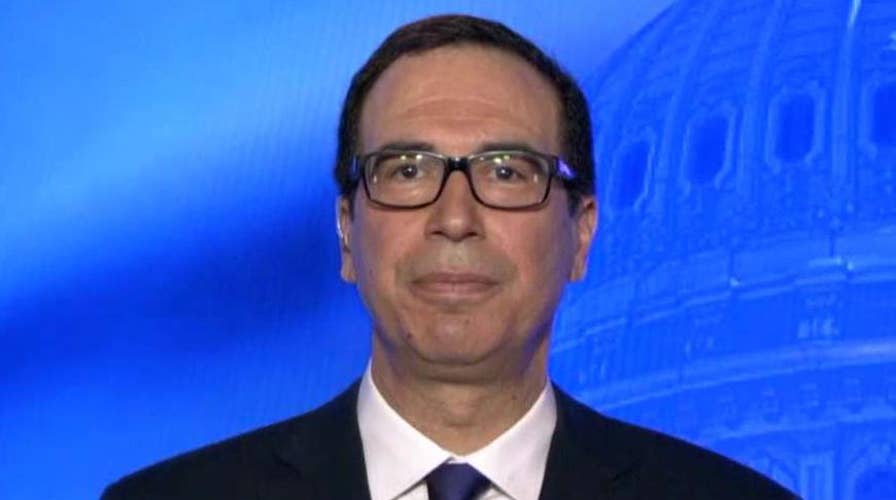Steve Mnuchin on Harvey relief, debt limit and tax reform
Treasury secretary weighs in on 'Fox News Sunday'
Treasury Secretary Steve Mnuchin said Sunday that his and President Trump’s “first priority” is to ensure Texas gets Hurricane Harvey relief money, which means Congress upon its return Tuesday should connect appropriating the funds to increasing the federal debt.
Congress had largely been expected since the deadly storm hit southeast Texas on Aug. 25 to pass a spending bill free of amendments, add-ons or other legislation to avoid the kind of political wrangling that for months delayed emergency funding for 2012’s Superstorm Sandy.
Members of Congress were then expected to resolve the debt ceiling issue. However, the realization that recovery efforts could cost as much as $190 billion has resulted in White House concerns about having enough ready cash.
"The president and I believe the [debt ceiling] should be tied to the Harvey funding,” Mnuchin told “Fox News Sunday.” “With Harvey, it's moved the situation up earlier. And without raising the debt limit, I'm not comfortable that we would get the money that we need this month to Texas to rebuild."
Trump is asking for at least $7.9 billion in disaster relief.
The government's cash reserves are running low because the debt limit has actually already been reached, and the Treasury Department is using various accounting measures to cover expenses.
Mnuchin originally had said that Congress would need to raise the $19.9 trillion borrowing limit by Sept. 29 to avoid a catastrophic default on the debt, allowing the government to continue borrowing money to pay bills like Social Security and interest.
But on Sunday, he said that deadline had moved up due to unexpected new spending on Harvey.
The Republican-controlled Congress -- which includes fiscal conservatives adverse to more spending or borrowing -- must upon returning also promptly agree on another key issue, passing a spending resolution to keep the federal government fully operational past Sept. 30.
“Our first priority is to make sure that the state gets money,” Mnuchin also said Sunday. "So we need to put politics aside.”
Trump in recent weeks suggested that he’d “close down” the government if the resolution doesn’t include money for his campaign-promised U.S.-Mexico border wall.
He has purportedly backed off the threat in recent days, in the aftermath of deadly and destructive Harvey. However, Mnuchin on Sunday declined to discuss the issue.
“I can’t really comment if it’s out the window,” he said. “I know that the wall is a huge priority to the president and we want to make sure that we get money for that. (But) I would say the president and my first objective right now is for the people of Texas and make sure we get the funding to do that.”
Mnuchin's spending-debt ceiling pitch resulted in a quick and favorable response from Congress’s top two Democratic leaders.
“Given the interplay between all the issues Congress must tackle in September, Democrats and Republicans must discuss all the issues together and come up with a bipartisan consensus,” Senate Minority Leader Chuck Schumer, New York, and House Minority Leader Nancy Pelosi, California, said in a joint statement.
Trump plans to meet with congressional leaders from both parties this week as lawmakers return to Washington after their summer recess.
Congress will also upon its return begin working on Trump’s plan to overhaul the federal tax code. Mnuchin said the plan is similar to the one presented in April, with the White House and Congress continuing to work out the “complicated details.”
He also suggested the White House wasn’t overly concerned about whether the plan includes ways to offset the loss of federal revenue from the tax cuts.
“The way we are going to pay for things is with economic growth,” Mnuchin said. “I think we may be in a situation where the administration believes we’ll get more economic growth than perhaps the models that come out of Congress. But we’ll be working with them on that.”
The Associated Press contributed to this report.






















